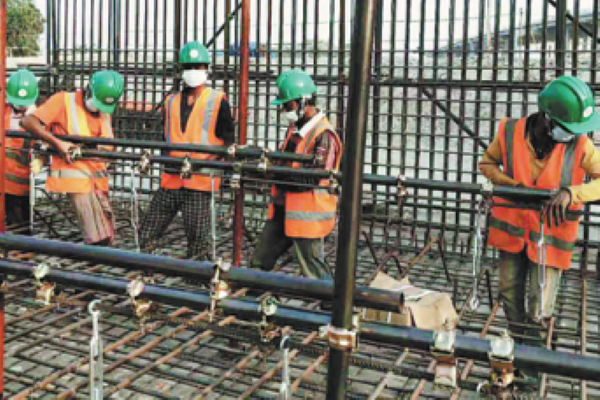CTCE overseas projects focus on safety, efficiency


While battling the COVID-19 pandemic, China Tiesiju Civil Engineering Group, a 70-year-old State-owned enterprise with comprehensive construction capabilities, has smoothly and safely continued its construction work on overseas projects, helping host countries boost their economies in the process.
As confirmed global COVID-19 cases exceeded 6 million as of May 31 with over 368,000 deaths, the pandemic has placed great pressure on the company's overseas operations. Yet it has withstood the challenge thanks to effective preventive measures, said Xiang Jian, a CTCE information official.
To accomplish the dual task of epidemic prevention and control work amid continuous construction, CTCE set up an overseas leading group in March committed to the "most stringent preventive measures in construction to forbid any infections".
At CTCE's construction sites along Bangladesh's Padma Bridge Rail Link Project, which commenced in July 2018, the local epidemic threat was severe.
The 168.6-kilometer-long project, running from Dhaka station to Jessore, is expected to boost the local GDP by 1.2 percent when completed at the end of 2022. The $3.13-billion project is a major part of the Bangladesh-China-India-Myanmar Economic Corridor, and also an important component within the Belt and Road transportation infrastructure.
To battle the coronavirus, CTCE staff upgraded prevention and control measures, strengthened ventilation and disinfection at work sites and living areas, regularly monitored employee health conditions and introduced dining in shifts, said Liu Shousheng, a CTCE team leader.
It also set up 26 centralized settlements, providing residential facilities for local employees living in scattered areas, and shuttled workers to and fro to reduce the risk of infection, he said.
CTCE also sent medical staff to work at construction sites. "None of the Chinese or Bangladeshi employees have been infected," said Kong Qinglin, the CTCE project leader.
As of mid-May, the output value of CTCE on the project had reached 296 million yuan ($43.5 million), thus safeguarding the cash earnings of the Bangladeshi employees.
CTCE's overseas team members also help host countries battle the contagion.
In Indonesia, CTCE is building a 25-km line for the Jakarta-Bandung High Speed Railway, Xiang said, adding that this year CTCE will increase its input of personnel and equipment.
On April 20, when certain regions mandated large-scale social isolation practices, CTCE's project management began to provide independent lodgings for Indonesian employees willing to live at various settlements, thus reducing close contact with the outside world, Xiang said.
In Mongolia, CTCE project managers at a new central wastewater treatment plant in Ulan Bator purchased 30,000 disposable surgical masks from China and donated them to the Mongolian ministry of construction, helping the country fight the contagion.
In battling the contagion, CTCE's overseas staff have devised creative measures to stabilize working conditions for employees at its sites. One strategy is to stockpile daily necessities to reduce unnecessary shopping trips, and another is to strengthen awareness of isolation tips.
At CTCE's branch company in Angola, employees helped plant more than 20 kinds of vegetables. "Our daily necessities are sufficient," said branch company Party Secretary Lu Honggang.
In response to concerns among construction workers and residents near the Bangladesh project, management dispatched employees to distribute epidemic prevention leaflets to locals, and created bilingual COVID-19 prevention cards, Xiang said, adding that this helped ease the worries of Bangladeshi employees and effectively reduced resignations.
With its overseas projects in full swing, CTCE has had to provide sufficient construction materials despite being hampered by contagion-impacted transportation and supply chain issues worldwide.
While COVID-19 rages the world over, CTCE has managed to ensure that supplies reach overseas projects on time by developing a smart overseas logistics platform.
The platform is based on modern information technologies such as Internet Plus mobile internet, quick response codes and location-based services ship positioning.
As of May 22, CTCE Materials Industry and Trade Co Ltd had approved 134 procurement contracts, 58 material suppliers and nine shipping agents through the platform, sending 32 batches of materials and equipment worth 195.55 million yuan, said Tan Xiaojie, the company's chief of overseas business department.
Despite the pandemic, China's first quarter investment in Belt and Road Initiative-involved economies still managed to rise 11.7 percent year-on-year, with a large number of temporarily-suspended projects resuming operation, Xiang said.




































